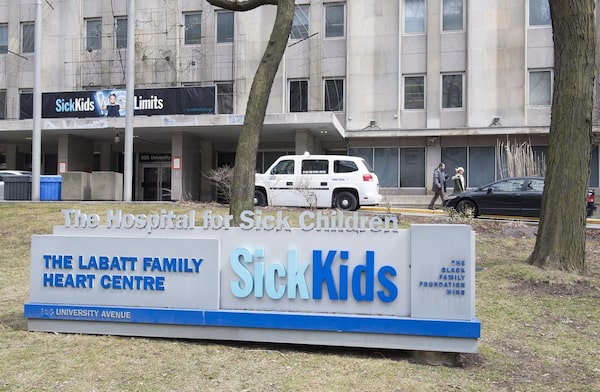
Toronto’s Hospital for Sick Children, recipient of the largest portion, will use $10-million to nearly double the beds in its Mental Health Inpatient Unit to 22 from 12.The Canadian Press
A new $30-million donation from the Slaight Family Foundation – one of the largest ever for mental-health care in Canada – will be spent increasing the number of inpatient beds and improving treatment access and support for young people, who often face long waiting lists – even as their need for care has grown more acute.
The money will be divided among 19 mental-health organizations and hospitals, most of them in Toronto, and mainly to expand or create programs for teenagers and young adults. The donation targets areas long seen as shortfalls in the system, including timely access to therapy and culturally sensitive care for Black and Indigenous youth.
Experts have been pointing to rising levels of anxiety and depression among vulnerable young people amid the pandemic. Even before COVID-19, the system was struggling with dramatic increases in the number of young Canadians visiting emergency rooms for suicidal ideation or self-harm.
Toronto’s Hospital for Sick Children, the recipient of the largest portion of the donation, will use $10-million to almost double the beds in its mental-health inpatient unit to 22 from 12. The unit will provide treatment to the most seriously ill patients, such as those coming out of intensive care after suicide attempts or at risk of organ failure because of eating disorders, a condition that has increased in terms of both numbers and severity during the pandemic.
“We are trying to help as much as possible in different areas,” said Gary Slaight, the president and chief executive of the Slaight Family Foundation. Although the donation was in the works before 2020, he pointed out that the pandemic has only exacerbated the pressure on hospitals and organizations to deliver mental-health services.
The donation is designed to cover the cost of programs for four years, with the option of more funding after that. Mr. Slaight said he hopes the programs will become “models of care and service for others to emulate.”
Part of the money will address another chronic gap: continuity of care for older teenagers as they age into the adult system. To that end, the Centre for Addiction and Mental Health (CAMH) in Toronto will receive $2.5-million to create a 25-bed unit for 16- to 25-year-olds to provide intensive treatment and connect patients to schools and employment. The Children’s Aid Foundation will use $1-million to expand therapy programs for young people who are leaving foster care.
The funds will also establish new programs for marginalized youth, who often have a harder time accessing support and treatment. With $1.5-million, Kids Help Phone will create a national text and chat line called Rise Up specifically for young Black Canadians. It will provide crisis support and referrals to culturally sensitive follow-up care.
“It is game-changing,” said Katherine Hay, the president and CEO of Kids Help Phone. In the past year, she said, some of the most distressed texters have been young people identifying as Black and experiencing discrimination and racism on top of anxiety about the pandemic. They were among the most likely to talk about suicide.
“It is on us that when we worry about young people in Canada that we don’t leave anyone behind. And Black youth were being left behind,” Ms. Hay said.
The Rise Up program was already in the works before the pandemic hit, she said, but it required the Slaight family donation to hire a program manager and additional Black professional counsellors.
The Slaight Family Foundation was founded in 2008 by Allan Slaight, a Canadian broadcast mogul and philanthropist.
The donation also includes funding to offer digital support for Indigenous youth and to improve care for LGBTQ youth.
Early and consistent intervention is especially important for young people, says Aristotle Voineskos, the vice-president of research at CAMH, because delays in treatment can negatively affect long-term outcomes. Younger patients, already at higher risk of dropping out of treatment, need smooth transitions so they remain in care. Given the rising rates of mental illness, and the uncertainty and stress created by the pandemic, Dr. Voineskos said of the donation: “The timing couldn’t be better.”
The money is also intended to help families find timely treatment in a confusing system. Some of it will be used by St. Michael’s and Sunnybrook hospitals, both in Toronto, to expand system navigation programs.
Portions will also go to support seniors and health care workers and to work in areas such as addiction and trauma.
Ideally, Mr. Slaight said, the funding will inspire more donations to mental-health programs. “We don’t have to tell people in this time that there’s an issue and it needs to be addressed,” he said. “We hope others will step forward.”
Our Morning Update and Evening Update newsletters are written by Globe editors, giving you a concise summary of the day’s most important headlines. Sign up today.